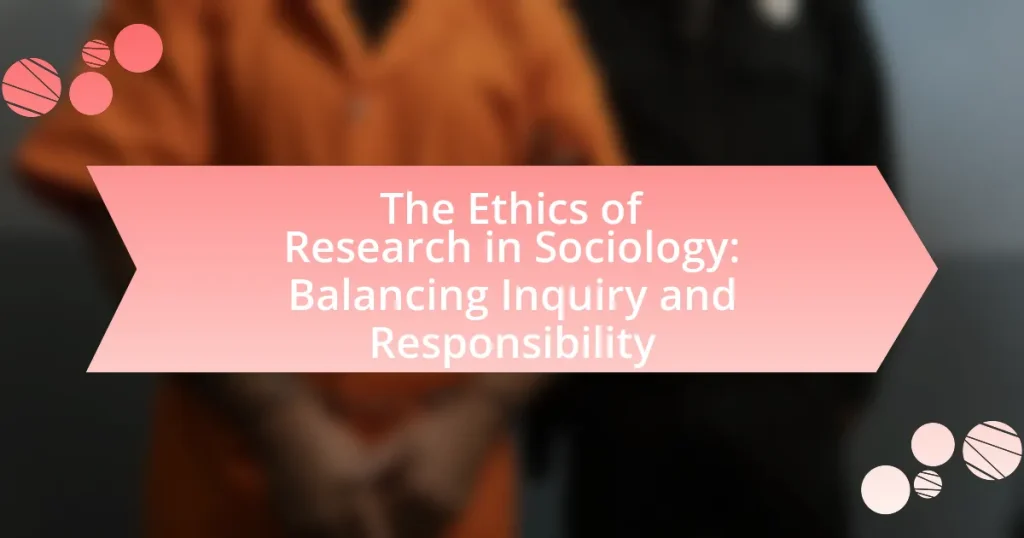The article focuses on the ethics of research in sociology, emphasizing the importance of balancing inquiry with responsibility. Key ethical considerations include informed consent, confidentiality, and minimizing harm to participants, as outlined by the American Sociological Association’s Code of Ethics. The article discusses foundational ethical principles such as respect for persons, beneficence, and justice, and explores how these principles apply across various research contexts. Additionally, it addresses challenges sociologists face regarding power dynamics, researcher bias, and the implications of ethical breaches, while providing strategies for implementing ethical practices and fostering a culture of ethics within research teams. Emerging trends and technologies are also examined, highlighting their influence on future ethical considerations in sociological research.

What are the key ethical considerations in sociology research?
Key ethical considerations in sociology research include informed consent, confidentiality, and the potential for harm. Informed consent requires researchers to ensure that participants understand the nature of the study and voluntarily agree to participate. Confidentiality involves protecting the identities and data of participants to prevent any potential repercussions from their involvement. The potential for harm refers to the obligation of researchers to minimize any physical, psychological, or social risks to participants. These ethical principles are essential to maintain trust and integrity in sociological research, as highlighted by the American Sociological Association’s Code of Ethics, which emphasizes the importance of ethical standards in conducting research.
How do ethical principles guide sociological inquiry?
Ethical principles guide sociological inquiry by establishing standards that protect participants’ rights and well-being. These principles, such as informed consent, confidentiality, and minimizing harm, ensure that researchers conduct their studies responsibly and ethically. For instance, the American Sociological Association’s Code of Ethics emphasizes the importance of obtaining informed consent from participants, which fosters trust and respects individual autonomy. Additionally, ethical guidelines require researchers to maintain confidentiality, safeguarding sensitive information and promoting the integrity of the research process. By adhering to these ethical standards, sociologists can conduct inquiries that not only advance knowledge but also uphold the dignity and rights of individuals involved in their research.
What are the foundational ethical principles in sociology research?
The foundational ethical principles in sociology research are respect for persons, beneficence, and justice. Respect for persons involves acknowledging the autonomy of individuals and obtaining informed consent before participation. Beneficence requires researchers to maximize benefits and minimize harm to participants, ensuring their well-being throughout the research process. Justice emphasizes fairness in the distribution of research benefits and burdens, ensuring that no group is unduly burdened or excluded from the potential benefits of research. These principles are outlined in the American Sociological Association’s Code of Ethics, which serves as a guideline for ethical conduct in sociological research.
How do these principles apply to different research contexts?
The principles of ethics in sociology apply to different research contexts by ensuring that researchers prioritize the welfare of participants, maintain integrity in data collection, and promote transparency in their findings. For instance, in qualitative research involving vulnerable populations, ethical principles necessitate obtaining informed consent and ensuring confidentiality to protect participants from potential harm. In quantitative studies, ethical guidelines require researchers to report data honestly and avoid manipulation, as evidenced by the American Sociological Association’s Code of Ethics, which emphasizes the importance of ethical conduct across various research methodologies. These principles are crucial in maintaining public trust and the credibility of sociological research.
Why is informed consent crucial in sociological research?
Informed consent is crucial in sociological research because it ensures that participants are fully aware of the nature, purpose, risks, and benefits of the study before agreeing to participate. This ethical requirement protects the autonomy and rights of individuals, fostering trust between researchers and participants. According to the American Sociological Association’s Code of Ethics, informed consent is fundamental to respecting participants’ dignity and promoting ethical research practices. By obtaining informed consent, researchers also mitigate potential harm and enhance the validity of their findings, as participants who understand the research context are more likely to provide honest and accurate responses.
What does informed consent entail for participants?
Informed consent for participants entails a clear understanding of the research purpose, procedures, risks, benefits, and the right to withdraw at any time without penalty. This process ensures that participants voluntarily agree to partake in the study based on comprehensive information. According to the Belmont Report, informed consent is a fundamental ethical principle in research, emphasizing respect for persons, which includes providing adequate information and ensuring comprehension. This principle is crucial for protecting participants’ autonomy and rights in sociological research.
How can researchers ensure participants fully understand their involvement?
Researchers can ensure participants fully understand their involvement by providing clear and comprehensive informed consent documents that outline the study’s purpose, procedures, risks, and benefits. This approach is supported by ethical guidelines in research, such as those established by the American Psychological Association, which emphasize the importance of transparency and comprehension in participant engagement. Additionally, researchers can facilitate understanding by conducting verbal explanations and allowing for questions, ensuring that participants grasp the information before agreeing to participate. This method aligns with best practices in ethical research, reinforcing the necessity of informed consent as a cornerstone of responsible inquiry in sociology.

What challenges do sociologists face in balancing inquiry and responsibility?
Sociologists face significant challenges in balancing inquiry and responsibility, primarily due to ethical dilemmas that arise during research. These dilemmas often involve the need to protect the rights and well-being of research participants while also pursuing objective and comprehensive data collection. For instance, sociologists must navigate issues such as informed consent, confidentiality, and the potential for harm to participants, which can conflict with the pursuit of knowledge. The American Sociological Association’s Code of Ethics emphasizes the importance of minimizing harm and ensuring the integrity of research, highlighting the necessity for sociologists to carefully weigh their research objectives against their ethical obligations.
How do power dynamics affect ethical research practices?
Power dynamics significantly influence ethical research practices by shaping the relationships between researchers and participants. When researchers hold more power, they may unintentionally exploit vulnerable populations, leading to ethical violations such as coercion or lack of informed consent. For instance, studies have shown that marginalized groups often face pressure to participate in research without fully understanding the implications, as highlighted in the work of Linda Tuhiwai Smith in “Decolonizing Methodologies,” which emphasizes the need for equitable power relations in research. This imbalance can compromise the integrity of the research process and the welfare of participants, underscoring the necessity for ethical guidelines that promote fairness and respect in research interactions.
What role does researcher bias play in ethical considerations?
Researcher bias significantly impacts ethical considerations by potentially skewing the integrity of research findings. When researchers allow personal beliefs, preferences, or experiences to influence their work, it can lead to selective reporting, misinterpretation of data, and ultimately, unethical conclusions. For instance, studies have shown that bias can affect the outcomes of social research, as highlighted in the work of John Ioannidis, who noted that biases in research can lead to misleading results and harm public trust in scientific inquiry. Therefore, recognizing and mitigating researcher bias is essential to uphold ethical standards and ensure the validity and reliability of research outcomes.
How can sociologists mitigate power imbalances in research?
Sociologists can mitigate power imbalances in research by employing participatory methods that actively involve marginalized communities in the research process. These methods, such as community-based participatory research (CBPR), empower participants by giving them a voice in defining research questions, data collection, and analysis. Evidence shows that CBPR leads to more equitable outcomes and enhances the relevance of research findings, as demonstrated in studies like “Community-Based Participatory Research: A Strategy for Building Healthy Communities” by Israel et al. (2003), which highlights the effectiveness of collaborative approaches in addressing social inequalities.
What are the implications of ethical breaches in sociology research?
Ethical breaches in sociology research can lead to significant consequences, including harm to participants, loss of trust in the research community, and compromised data integrity. When researchers violate ethical standards, such as obtaining informed consent or ensuring confidentiality, they risk causing psychological or physical harm to individuals involved in the study. For instance, the Tuskegee Syphilis Study exemplifies how ethical violations can lead to long-term distrust among marginalized communities towards medical and social research. Additionally, breaches can undermine the credibility of research findings, as data collected under unethical conditions may be viewed as unreliable or biased, ultimately affecting policy decisions and societal understanding. The American Sociological Association emphasizes the importance of ethical guidelines to protect participants and maintain the integrity of the discipline, highlighting that ethical lapses can have far-reaching implications for both individuals and the broader field of sociology.
What are the potential consequences for participants?
Participants in sociological research may face several potential consequences, including psychological distress, privacy violations, and social repercussions. Psychological distress can arise from discussing sensitive topics, leading to emotional discomfort or trauma. Privacy violations may occur if personal data is inadequately protected, resulting in unauthorized disclosure of sensitive information. Social repercussions can manifest as stigma or discrimination if participants’ identities or experiences are revealed, impacting their relationships and social standing. These consequences highlight the importance of ethical considerations in research design and implementation, ensuring that participants’ rights and well-being are prioritized.
How can ethical violations impact the credibility of sociological research?
Ethical violations can severely undermine the credibility of sociological research by eroding trust among participants, the academic community, and the public. When researchers engage in unethical practices, such as manipulating data, failing to obtain informed consent, or violating confidentiality, the integrity of their findings is called into question. For instance, a study published in the journal “Social Problems” highlighted that research misconduct can lead to retractions and loss of professional reputation, which directly affects the perceived validity of the research outcomes. Consequently, ethical breaches not only compromise the quality of the data collected but also diminish the overall reliability of sociological insights, making it difficult for future research to build upon flawed foundations.

How can sociologists implement ethical practices in their research?
Sociologists can implement ethical practices in their research by adhering to established ethical guidelines, such as obtaining informed consent, ensuring confidentiality, and minimizing harm to participants. These practices are essential to protect the rights and welfare of individuals involved in sociological studies. For instance, the American Sociological Association’s Code of Ethics emphasizes the importance of transparency and respect for participants, which helps build trust and integrity in research. Additionally, sociologists should engage in ethical review processes, such as Institutional Review Board (IRB) evaluations, to ensure that their research proposals meet ethical standards and address potential risks. This adherence to ethical guidelines not only safeguards participants but also enhances the credibility and validity of sociological research.
What strategies can researchers use to uphold ethical standards?
Researchers can uphold ethical standards by implementing rigorous informed consent processes, ensuring participant confidentiality, and adhering to ethical review board guidelines. Informed consent involves clearly communicating the purpose, risks, and benefits of the research to participants, allowing them to make an educated decision about their involvement. Maintaining participant confidentiality protects sensitive information, fostering trust and encouraging honest participation. Ethical review boards, such as Institutional Review Boards (IRBs), provide oversight to ensure that research complies with ethical norms and regulations, thereby safeguarding participant rights and welfare. These strategies are essential for maintaining integrity and accountability in sociological research.
How can peer review contribute to ethical research practices?
Peer review contributes to ethical research practices by ensuring that research is rigorously evaluated by experts before publication. This process helps identify potential ethical issues, such as conflicts of interest, inadequate consent procedures, or flawed methodologies, which can compromise the integrity of research findings. Studies have shown that peer-reviewed articles are more likely to adhere to ethical standards, as reviewers often scrutinize the ethical implications of the research design and execution. For instance, a review published in the journal “Research Ethics” highlights that peer review serves as a safeguard against unethical practices by promoting transparency and accountability in research.
What role does ethics training play in preparing sociologists?
Ethics training is essential in preparing sociologists by equipping them with the knowledge and skills to conduct research responsibly and ethically. This training helps sociologists understand the importance of informed consent, confidentiality, and the potential impact of their research on communities. For instance, the American Sociological Association emphasizes ethical standards that guide sociologists in their research practices, ensuring that they prioritize the welfare of participants and the integrity of their findings. By integrating ethics training into their education, sociologists are better prepared to navigate complex moral dilemmas and uphold the ethical standards necessary for credible and responsible research.
What best practices should sociologists follow for ethical research?
Sociologists should follow informed consent, confidentiality, and integrity as best practices for ethical research. Informed consent requires researchers to fully disclose the nature of the study, potential risks, and the voluntary nature of participation, ensuring that participants understand and agree to their involvement. Confidentiality involves protecting the identities and data of participants, which is crucial for maintaining trust and encouraging honest responses. Integrity mandates that sociologists conduct their research honestly, report findings accurately, and avoid any form of deception or manipulation. These practices are supported by ethical guidelines established by organizations such as the American Sociological Association, which emphasizes the importance of ethical standards in promoting responsible research and protecting participants’ rights.
How can researchers create a culture of ethics within their teams?
Researchers can create a culture of ethics within their teams by establishing clear ethical guidelines and fostering open communication about ethical dilemmas. Implementing a code of ethics that outlines acceptable behaviors and decision-making processes ensures that all team members understand the ethical standards expected of them. Regular training sessions on ethical practices can reinforce these guidelines and encourage discussions about real-world scenarios, promoting a shared understanding of ethical responsibilities. Furthermore, creating an environment where team members feel comfortable voicing concerns or reporting unethical behavior without fear of retaliation is crucial. Studies show that teams with strong ethical cultures report higher levels of trust and collaboration, which enhances overall research integrity.
What resources are available for sociologists to enhance their ethical practices?
Sociologists can enhance their ethical practices through various resources, including professional guidelines, training programs, and ethical review boards. The American Sociological Association (ASA) provides a Code of Ethics that outlines ethical standards and practices for sociologists, ensuring responsible research conduct. Additionally, many universities offer workshops and courses focused on research ethics, which equip sociologists with the necessary skills to navigate ethical dilemmas. Institutional Review Boards (IRBs) also play a critical role by reviewing research proposals to ensure compliance with ethical standards, protecting the rights and welfare of research participants. These resources collectively support sociologists in maintaining ethical integrity in their research endeavors.
What are the future directions for ethics in sociology research?
Future directions for ethics in sociology research include a stronger emphasis on participatory research methods, increased transparency in data collection and analysis, and a focus on the ethical implications of digital research practices. Participatory research methods empower subjects by involving them in the research process, which enhances ethical considerations and respects their autonomy. Transparency in data practices is crucial as it builds trust and accountability, especially in an era where data privacy concerns are paramount. Furthermore, as digital tools become more prevalent in sociology, researchers must navigate the ethical challenges associated with online data collection, ensuring that they protect participants’ rights and confidentiality. These directions reflect a growing recognition of the need to balance rigorous inquiry with social responsibility in the field of sociology.
How might emerging technologies influence ethical considerations?
Emerging technologies significantly influence ethical considerations by introducing new dilemmas related to privacy, consent, and data security. For instance, the rise of artificial intelligence and big data analytics raises concerns about how personal information is collected, stored, and used, often without explicit consent from individuals. A study by the Pew Research Center in 2021 found that 81% of Americans feel that the potential risks of data collection by companies outweigh the benefits, highlighting widespread apprehension regarding ethical practices in technology. Additionally, technologies such as facial recognition and surveillance systems pose challenges to individual privacy rights, prompting discussions about the ethical implications of their deployment in public spaces. These examples illustrate how emerging technologies necessitate a reevaluation of ethical frameworks to ensure responsible research practices in sociology and beyond.
What trends are shaping the future of ethical research in sociology?
Trends shaping the future of ethical research in sociology include increased emphasis on participant consent, the integration of technology in data collection, and a focus on social justice. Researchers are prioritizing informed consent processes, ensuring that participants fully understand their involvement and the implications of the research. The rise of digital tools, such as online surveys and social media analytics, is transforming data collection methods, necessitating new ethical guidelines to protect participant privacy. Additionally, there is a growing commitment to social justice, where researchers aim to address power imbalances and advocate for marginalized communities, reflecting a shift towards more responsible and equitable research practices. These trends are supported by evolving ethical standards from organizations like the American Sociological Association, which emphasizes the importance of ethical considerations in sociological research.
